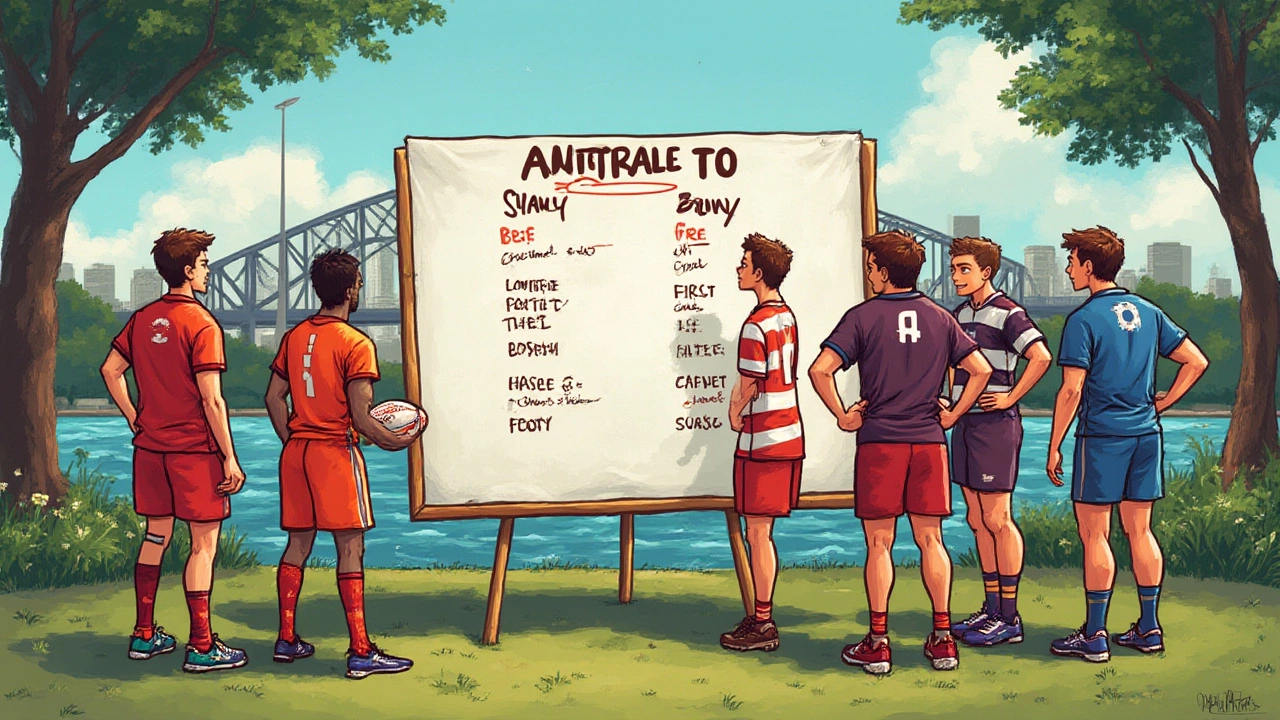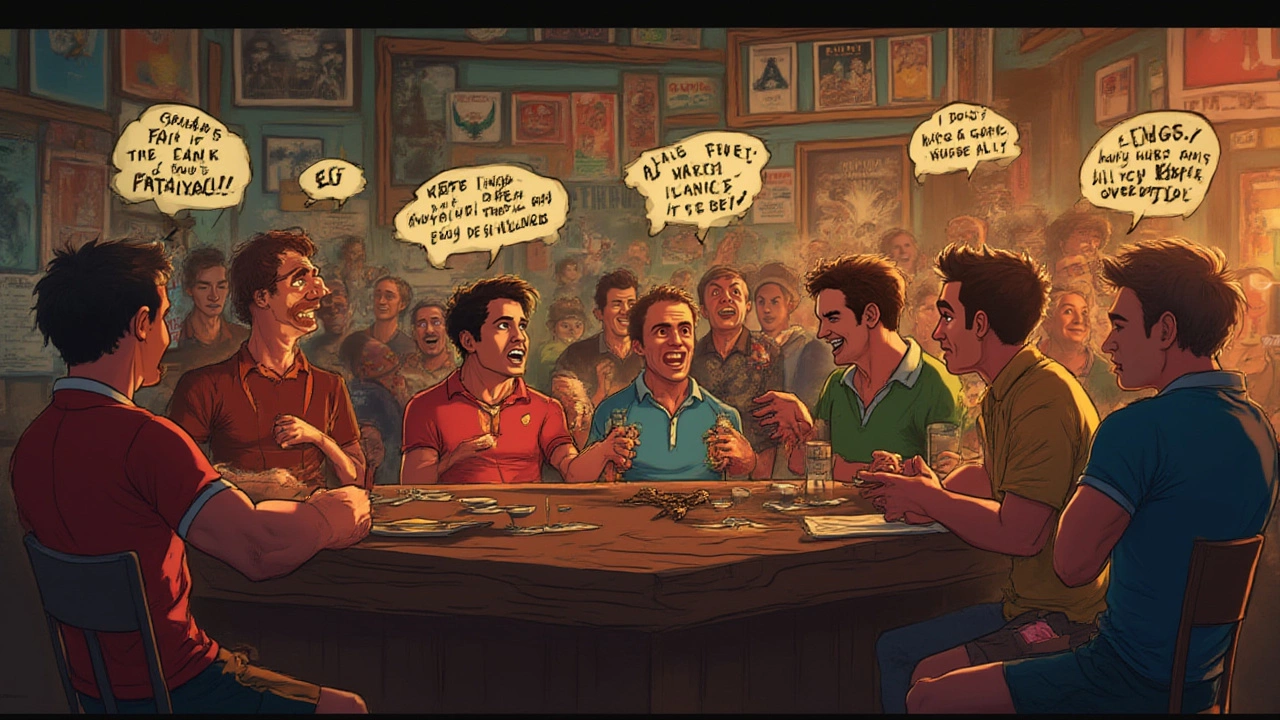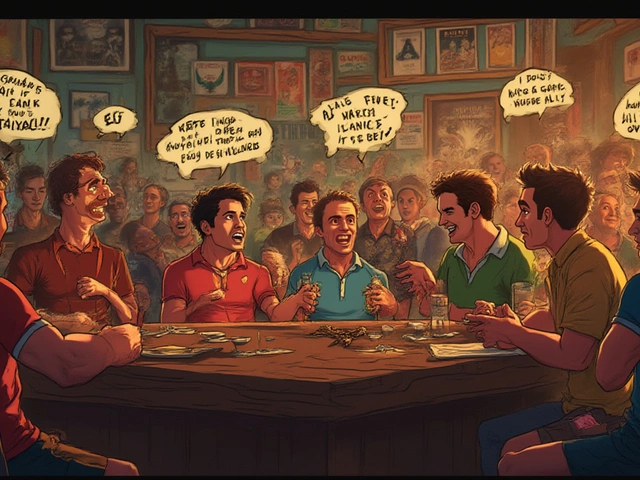Step off the plane in Sydney or Melbourne wearing a rugby jersey, and the first thing you’ll notice is Aussies don’t call the game what you might expect. And don’t even try using "rugger"—that’s more Oxford than Outback. Australian rugby slang isn’t just quirky local flavor. It reveals tribal loyalties, divides cities, and even sparks playful arguments in pubs. How can one word—“rugby”—mean so many things Down Under?
The Many Names For Rugby in Australia
Wander through Sydney’s heart and someone mentions a rugby game, but don’t assume everyone’s talking about the same code. Australians use different names for the sport, depending on which version: rugby union or rugby league. In most of the rugby-playing world, “rugby” means union. But in Australia, it’s a toss-up. Walk into a Ben Boyd Road café, and if someone says “rugby,” you need to ask: "League or union?" This isn’t just a trivial difference. Union and league are more like cousins who share a surname but never turn up at the same family BBQ.
This tension goes back ages. Rugby first came to Australia in the 1860s as union. Then, rugby league split away in 1908. Since then, the codes have gone their separate ways, with their own competitions, heroes, and fans. In Sydney and Brisbane, where league dominates, “rugby” or "the rugby" is shorthand for rugby league. Here, if you mention "footy," it almost always means league. In contrast, cities like Canberra and Perth might use “rugby” to refer to union, especially when the Brumbies (union) hit the field. The word “union” is used, but usually with a nod—“You know, rugby union.” League fans, on the other hand, are fiercely loyal and rarely clarify unless pressed.
Aussie slang is packed with abbreviations, so “league” often becomes “rugby league,” “the league,” or just “league.” “Union” is for rugby union. But don’t try saying “union” in Melbourne sporting circles—you’ll just confuse everyone. Victoria’s heart is AFL—Aussie Rules “football” or “footy.” Mention “footy” there and people think of big-armed blokes in singlets chasing an oval ball with no offside rule in sight. So, the answer to what Aussies call rugby depends on context, state, and sometimes, how old you are.
If you love trivia, here’s a real zinger: One 2021 survey found 53% of New South Wales respondents thought of “rugby” as league, compared to 17% nationally. But ask someone from South Australia, and “rugby” is just a thing they watch occasionally—if it’s on TV.
So, rule of thumb: “Rugby” is a chameleon term in Australia. Know your crowd. Want to blend in? Ask: “You mean union or league?”
Why Rugby League and Union Are Different Camps
The split between rugby league and union isn’t just history—it’s daily life. Each code has its own fans, lingo, and weekend rituals. League began as the working man’s game. Union was more for the private school set. These days, boundaries are blurrier, but old divides still influence slang. For example, in schools on Sydney’s North Shore, students grow up calling the game “union.” In the western suburbs, it’s “league.” Turn up to a match at Leichhardt Oval and yell “Go union!” and you’ll get weird looks, maybe even a playful jab about needing to head back to the eastern suburbs or GPS schools.
Here’s what really separates the two on the field. Rugby union has 15 players per side; league has 13. The rules are different: in league, after being tackled six times, you surrender possession. In union, you ruck, maul, and keep the ball alive through different means. The scoring differs. The tactics look worlds apart. Even the crowd behavior varies. Union crowds tend to be quieter, often sipping on drinks and analyzing strategy. League crowds? More raucous, more passionate chants, and less fuss about etiquette.
You’ll see the codes split by geography too. League’s heartland covers New South Wales and Queensland, especially in working-class neighborhoods. Union is bigger in Canberra, some Sydney strongholds, and WA’s expat communities. AFL dominates everywhere else. There’s also a gender split. Many private girls’ schools play union sevens, but league is the backyard standard in many suburbs.
The language follows suit. “Leaguey” and “leaguies” are fans of league. “Unionites” or “rugby heads” love union. Both can be fiercely proud—everyone claims their code is the real deal. And don’t be fooled by American-style words like “football”—when Aussies use “football,” context tells you whether they mean rugby, league, or AFL.
One thing unites all camps: most Aussies rarely say “rugger.” That’s British, and Aussies prefer their own slang. When in doubt, listen for the clues. “Try” is a universal term, meaning a score, but everything else diverges. Rugby league fans idolize the “NRL”—National Rugby League. Union folk talk about the “Wallabies” (the Australian national team) and the “Super Rugby” competition. League fans follow “State of Origin”—a New South Wales vs Queensland rivalry that stops the country. Union fans care more about “the Tests,” especially clashes with New Zealand’s All Blacks.
If you feel totally lost, don’t worry. Most lifelong Aussies struggle to keep up as well. Just remember: where you stand tells people which code you follow—and, in some places, even hints at your class or upbringing.

Everyday Rugby Chat: Tips For Talking Like an Aussie Fan
Fitting in with Aussie rugby talk isn’t about learning Shakespeare—think sound bites, nicknames, and abbreviations. Kick off with a chat about the weekend’s “footy” and someone will ask, “You mean league or union?” If you’re in a Sydney pub, nodding along works if you’re lost. But want to sound like you know your stuff? Use the right words for the location and occasion.
First, never mix up “rugby league” and “rugby union.” The difference matters. Screaming “Go the league!” at a Waratahs (union) match will instantly mark you as an outsider. In northern NSW, refer to the “Blues” and people light up—these are league’s New South Wales State of Origin heroes. In union, they’re the Waratahs.
Here’s a handy tip: If you’re watching league, mention “the NRL,” “the Origin,” or talk about “the finals.” If it’s union, bring up “Super Rugby,” “the Wallabies,” or a “Bledisloe” test (that’s the famous rivalry with New Zealand). It sounds simple, but just knowing which comp is on TV can win you friends.
Struggling with the slang? Here’s a quick guide:
- Footy: Means league in NSW and QLD, AFL in VIC, rarely union.
- League: Rugby league, especially in heartland states.
- Union: Rugby union, mostly in schools and clubs.
- NRL: National Rugby League, the main league competition.
- Super Rugby: International club rugby union comp.
- Wallabies: Australia’s national rugby union team.
- Kangaroos: Australia’s national rugby league team.
- Origin: State of Origin, the league showdown.
- Bledisloe: Union’s ultimate Australia-NZ battle.
Here’s a table to break it down:
| Term | Meaning in NSW/QLD | Meaning in VIC/SA/WA |
|---|---|---|
| Footy | Rugby league | Aussie Rules (AFL) |
| Rugby | League (often) | Union (sometimes) |
| League | Rugby league | Unfamiliar, or NRL |
| Union | Rugby union | Rarely used |
Not sure what someone means? Just ask, "Which code?" It’s a surefire Aussie conversation starter. And if you want to impress, learn the names of famous players—mention Johnathan Thurston or Brad Fittler for league, or Michael Hooper and David Pocock for union. People will know you’re in the loop.
Fun Facts and Figures: The Rugby Culture Clash
Australians are sports obsessed—there’s a stat for everything, like steak at a pub lunch. In 2023, nearly 1.2 million Aussies played some kind of rugby. Rugby league edges out union in player numbers, especially among juniors. The NRL grand final in Sydney pulls more TV viewers than most other sporting events (except AFL, of course).
Want to know why the divide is so deep? It started with class. Rugby union was for private schools, league for everyone else. This changed in recent years, but echoes remain. Even government data reflects it—a 2021 AusPlay survey listed rugby league as the choice for 465,000 kids, while union had around 300,000. At the same time, AFL (the main rival) dominates nationally. Mention “footy” in Melbourne and they’ll ask which club you support—meaning an AFL side every time.
Another fun fact—Australians rarely use “soccer” for football. Our football means three things depending on postcode. In central Queensland, it’s always league. In Perth, rugby often means union, if it means anything at all. If a coach in Adelaide asks kids to play “rugby,” half might turn up expecting a soccer ball.
Do Aussies care about the difference? Desperately. The origin series in league can empty city streets. Super Rugby finals have fans glued to screens, especially in Canberra. Clubs run year-round, and Saturday arvos (afternoons) see local fields crammed from Bondi to Brisbane.
Here’s the thing: the language you use—league, union, or footy—instantly signals your tribe. It’s why out-of-towners sometimes feel lost. But it’s also why talking sport is a rite of passage. Ask someone about their favorite team, and you’ll break the ice instantly.
- State of Origin matches (rugby league) drew an average of 2.3 million TV viewers in 2023.
- The Wallabies’ biggest wins in the 1999 and 2003 Rugby World Cups remain sources of pride for union fans.
- Travelling from Brisbane to Melbourne? Remember: "rugby" shifts meaning mid-flight.
The short answer to the question—“What do Aussies call rugby?”—depends who you ask, and where you’re standing. But if you want to talk sport like a local, start with the code, know your teams, and always be ready for some good-natured banter. Nobody loves talking sport more than Aussies—and understanding the language of rugby is half the fun of getting involved.

